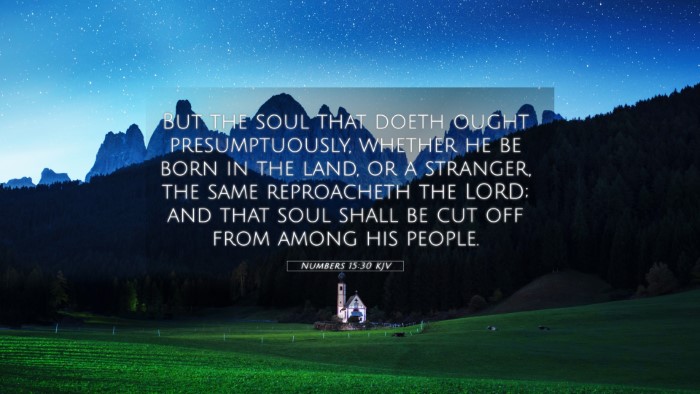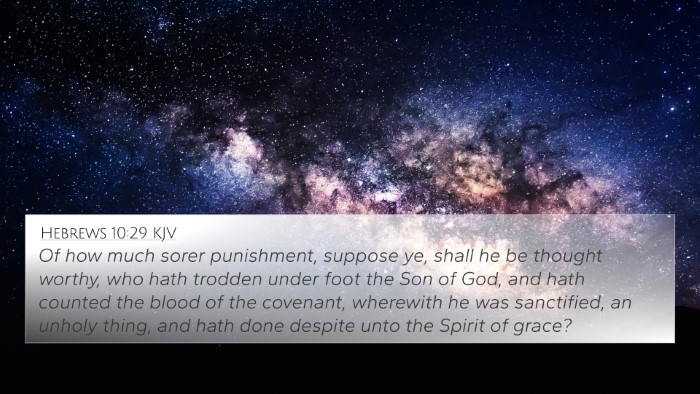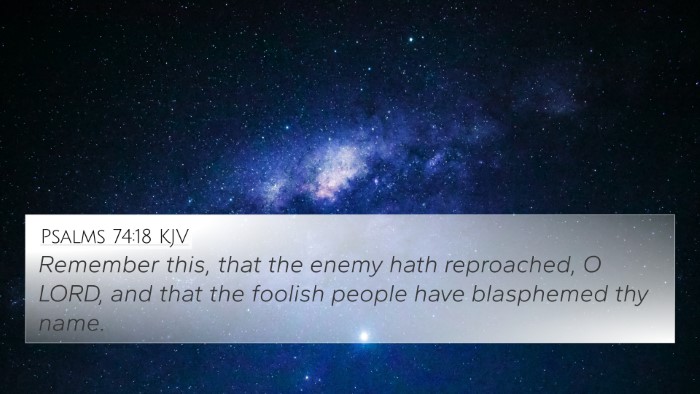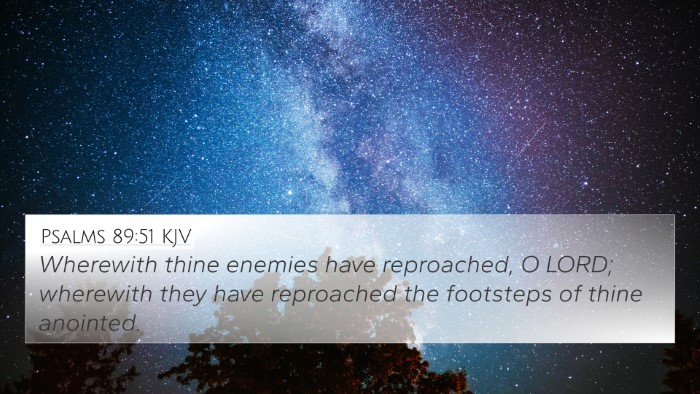Understanding Numbers 15:30
Verse: "But the soul that doeth ought presumptuously, whether he be born in the land, or a stranger, the same reproacheth the LORD; and that soul shall be cut off from among his people."
Summary of Meaning
Numbers 15:30 addresses the issue of presumptuous sin against God and its severe consequences. Those who commit sins with a willful heart, whether they are native-born Israelites or foreigners, are held accountable. This verse emphasizes the importance of reverence towards God and the gravity of deliberate transgression. The commentary from Matthew Henry indicates that the act of reproaching the Lord reflects both pride and defiance. It underscores the notion that sinning knowingly is far more serious than unintentional mistakes.
Insights and Analyses from Renowned Commentaries
Matthew Henry: He elaborates on the concept that deliberate sin is an affront to God's sovereignty and holiness. Sin committed in arrogance not only harms the sinner but also pollutes the community and defies God's law.
Albert Barnes: Barnes points to the seriousness of the sin committed by individuals who know the law but choose to break it, reflecting a hardened heart. He emphasizes that the consequence is spiritual death, which signifies separation from God and loss of covenant privileges.
Adam Clarke: Clarke suggests that the punishment for presumptuous sins serves as a deterrent, reiterating that disregard for God’s commandments incurs grave consequences. He also notes that this principle was crucial for the community’s moral integrity.
Cross-References
To better understand the implications of Numbers 15:30, here are several related verses:
- Hebrews 10:26-27: Discusses the dire consequences for willfully sinning after receiving the knowledge of the truth.
- Deuteronomy 17:12-13: Emphasizes the responsibility of individuals to heed the authority of the priest and judges to avoid punishment.
- Leviticus 24:16: Establishes that blasphemy carries serious penalties, reinforcing the seriousness of reproaching God.
- James 4:17: Highlights that knowing what one ought to do and failing to do it is sin, aligning with the focus on presumptuous sins.
- Romans 1:18: Discusses the wrath of God against ungodliness and unrighteousness, echoing the themes of accountability in Numbers 15:30.
- Galatians 6:7: Warns that whatever a person sows, they will also reap, tying in the concept of consequences for one's actions.
- 1 John 5:16: Differentiates between sin that leads to death and sin that does not, further categorizing the severity of transgressions.
- Ephesians 5:5: Identifies that no immoral person has an inheritance in the kingdom of Christ, illustrating the exclusion pertaining to presumptuous sins.
- Proverbs 28:13: States that whoever conceals their sins shall not prosper, reinforcing the idea of accountability.
- Matthew 12:31-32: Talks about the blasphemy against the Holy Spirit, shedding light on unforgivable actions against God.
Thematic Connections
The themes presented in Numbers 15:30 are echoed throughout various scriptures, creating an inter-Biblical dialogue on the nature of sin, accountability, and God's holiness. The act of linking Bible scriptures reveals not only the continuity of God's message but also the serious ramifications of willful disobedience across different contexts and testaments.
Applications for Bible Study
To fully grasp the depth of this verse, it's imperative to utilize tools for Bible cross-referencing. Engaging with a Bible concordance or a cross-reference Bible study guide can provide significant insights. By employing cross-referencing methods, one can construct a framework of how different verses are connected thematically and contextually, enriching one's understanding of Biblical principles.
Conclusion
Numbers 15:30 serves as a profound reminder of the accountability believers have before God. The commentary insights collectively underscore the severity of presumptuous sins, while the cross-references highlight the broader implications of such actions throughout Scripture. As we engage in comparative Bible verse analysis, it becomes evident that understanding individual verses within the tapestry of the Bible enhances comprehension and spiritual growth.
























